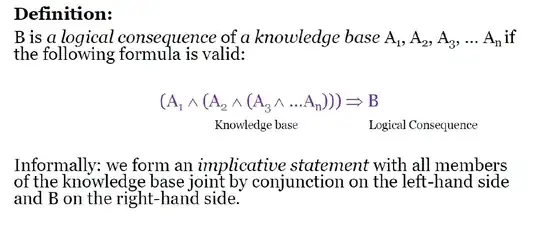What is the correct definition for logical consequence?
I came across a note which says,
It makes me think that what we have to do is check whether the compound proposition Knowledge base -> B is a tautology.
But according to the definition in How to prove logical consequence?
I feel that I need to check only the places where (Knowledge base, that is, A1 and A2 and ...and An, is havving the truth value "True". If the corresponding truth value for B then is also "True" then it is a logical consequence?
Please help me to clarify this idea.
Thanks a lot in advance.
